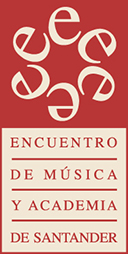2007 Edition
The Academy
The 7th Encounter of Music and Academy will be held, as in previous occasions, from July 1st to July 25th and, as foreshadowed in the title of the event, the Encounter intimately links both the academic and artistic activity. The Academy will take place in the installations of the Jesús de Monasterio Professional Conservatory of Music. For about a month, sixteen maestros of international renown will get together with over ninety young musicians from all parts of the world.
The master classes this year will cover flute, oboe, clarinet, fagot, horn, piano, violin, viola, violoncello and double bass with a very strong emphasis on group music. The work will concentrate on chamber music in general and string quartets in particular along with intense orchestral practice. In this edition, John Corigliano will be composer-in-residence and the work of the Encounter will put a special accent on U.S. music, a country that during the last century came into the international composition scene with forcefulness.
Master Classes
Judging from the experience of previous years, the atmosphere created throughout the Encounter of Music and Academy is very open and conducive to a friendly get-together between young and established maestros. However, the bases of such an atmosphere does not deter from intense sessions of masterclasses. The work at the Jesús de Monsterio Conservatory is very productive and the pace very lively. There is hardly any pause between the lessons in the classrooms, individual study in practice rooms, joint work of chamber music groups, orchestral rehearsals and the broadening of viewpoints appearing on Magister Musicae screens.
During this time, the concentration of musicians of great prestige at the Jesús de Monsterio Conservatory is exceptional (Bron, Marcovici, Gulyás, Shakhovskaya, Neubauer, Hoffman, Martin, Steffens, Bourgue, Schmidt, Thunemann, Margulis, Zepperitz, Vlatkovic, Corigliano, Csaba….) and the young musicians efficiently make good use of such accumulation of knowledge.
The participants in the Encounter are asked to join directly by invitation following a number of auditions organized by Maestro Péter Csaba, Artistic Director of the Encounter. This year, the students come from the Royal Academy of Music and the Royal College of Music in London, Conservatoire Supérieur de Musique in Paris, Hochschule für Musik Hanns Eisler in Berlin, Sibelius Academy in Helsinki, Liszt Ferenc Academy in Budapest, Academy for the Performing Arts, in Prague, Escuela Superior de Música Reina Sofía and the International Institute of Chamber Music in Madrid.
Individual lessons and group music
In addition to the individual classes, the Encounter – as the name itself suggests, places very special emphasis on playing music in groups. The individual instrument professors direct chamber music practice sessions and some have been expressly designated to conduct ensemble classes, such as string quartets and orchestral activity.
Since the very first year it was held, the Encounter opted to focus strongly on chamber music because, in addition to providing a channel from both the academic and artistic standpoints to an attractive repertory not sufficiently known, chamber music contributes with very useful educational elements and gives rise to a kind of interaction among young musicians and established performers, which is highly enriching to all. In fact, working together in music shapes the Encounter’s distinctive personality. A range of perspectives on chamber work is ensured by the variety of the master musicians who direct it.
Orchestra
The activity of the orchestra embodies an important academic element in addition to the artistic factor. This year orchestral work will have two phases, both under the baton of Maestro Péter Csaba. During the first phase the Symphony Orchestra will gather to study for six days the work of one of John Corigliano’s, composer-in residence, most important works and two very demanding works of the romantic repertory such as Brahms “Haydn Variations” and Tchaikovsky’s “Symphonie Pathétique”. The phase of strings orchestra will be entirely dedicated to U.S. music: Corigliano’s “Voyage”, Barber’s “Adagio” and Copland’s “Concerto for Clarinet”.
